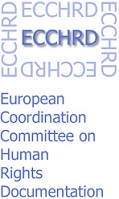The 30th meeting of the ECCHRD was organised by the Raoul Wallenberg Institute of Human Rights and Humanitarian Law (RWI) in collaboration with the International Secretariat of Amnesty International in London, acting as Secretariat for the meeting. The meeting was held at the Raoul Wallenberg Institute in Lund, Sweden.
The Keynote speech was given by Hans Rosling, Professor of International Health at the Karolinska Institutet, Stockholm, who gave a thought-provoking presentation on A fact based world view. The presentation on the political aspects of human rights was illustrated with a demonstration of the Gapminder tool.
Anna Svenson, who works for the Archives of the Municipality of Malmö, gave a presentation on the importance of archives for human rights.
The second day started with a tour of the library of the Raoul Wallenberg Institute. Following, Håkan Carlsson, Director of Scientific Communication at Lund University Libraries, gave a presentation on access to scientific information. Damon Rand, Analyst/Programmer from Amnesty International (AI) gave a presentation of AI’s use of wiki technology to record case information on individuals. This was followed by an update on the work of HURIDOCS, by Bert Verstappen. Carin Laurin, Publications Officer at the Raoul Wallenberg Institute presented a new project which identifies indicators to measure the state compliances with human rights laws and norms and Lena Olsson of RWI demonstrated the RWI Human Rights Theme Maps.
There were working groups on the following themes: Torture Thesaurus, the European Union Fundamental Rights Agency, the Technical Advisory Group and Indexing.
Presentations available:
- AI’s use of wiki technology to record case information on individuals, by Damon Rand, Amnesty International
- Open_access to scientific information, by Håkan Carlsson, Lund University Libraries
